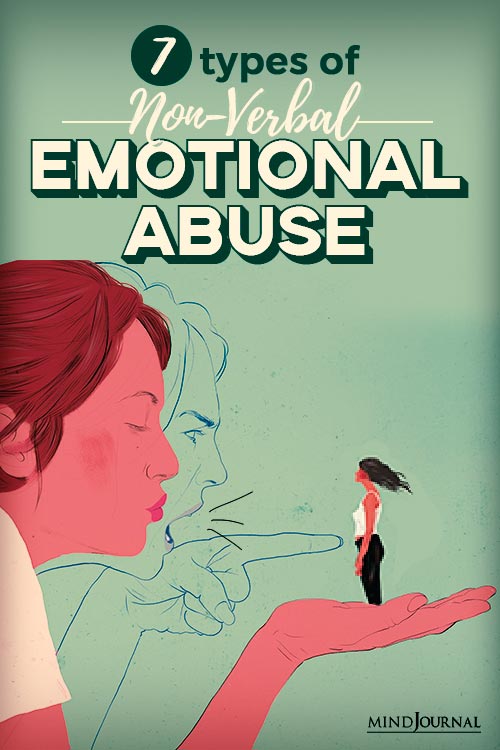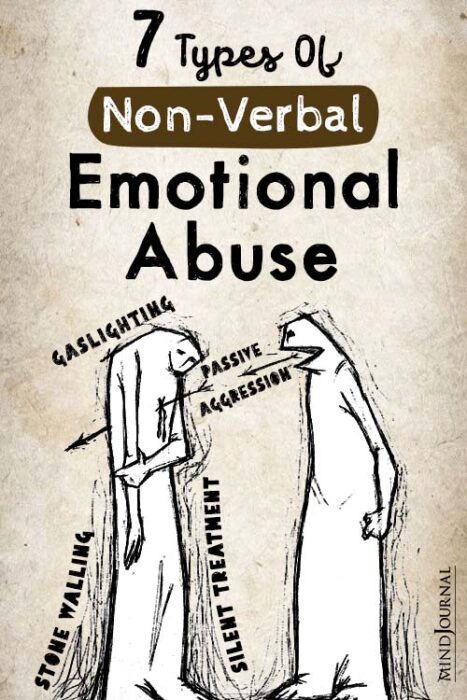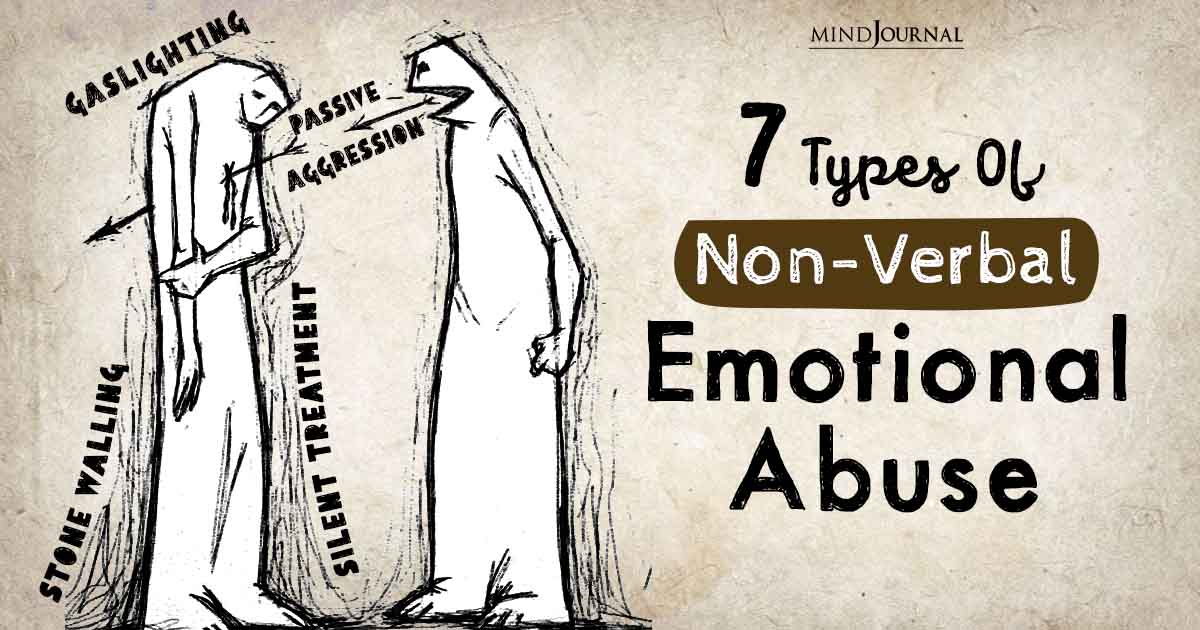When you think of verbal abuse, you most probably think of yelling, screaming, name-calling, and abusing, don’t you? But the thing with abuse is that a lot of times, it isn’t always evident and in your face, and there can be several types of non verbal emotional abuse.
But that doesn’t mean it is any less harmful. Abuse, be it verbal or non-verbal can break your heart into pieces and have a damaging impact on your mental and emotional health, nevertheless.
But what does non verbal emotional abuse look like? How would you know that you’re on the other side of it? Let’s explore the seven types of non verbal emotional abuse.
7 Types Of Non Verbal Emotional Abuse
1. Gaslighting
When someone makes you question your reality and tries to convince you that what you’re saying never happened, that is gaslighting.
Some of the most common gaslighting statements can sound like:
“That never happened!”
“You are imagining things!”
“I never said that, you’re making things up!”
“I was just joking!”
“You are crazy”
By gaslighting you, your abuser tries to pin the whole blame on you by making you doubt your sanity. They know they’re guilty, but they make you out to be the culprit. This is one of the worst types of emotional abuse a person can go through.
2. Absence of emotional support and validation
Withholding appreciation, praise, emotional support, and kind words just because they don’t want to make you feel good is another form of subtle psychological abuse.
They always criticize, undermine, and humiliate you in the name of tough love, but never once appreciate you for your accomplishments and hard work. This lack of acknowledgment and love can make you feel like you don’t deserve love, or that you have to earn their love.
Invalidating your emotions and beliefs like this makes you feel like you are never good enough, and will never be good enough.
3. Silent Treatment
Silent treatment might not seem like emotional abuse, but it surely is. Ignoring someone by cutting them off is not just an emotionally painful thing to go through, it can also affect your self-esteem.
This is a form of emotional neglect and emotional indifference.
You feel worthless, lonely and your confidence hit’s an all-time low, and before you know it, you start blaming yourself for everything.
You question and punish yourself constantly because their silence makes you think that you did something wrong.
And then after tormenting you for a few days, they come back and behave as if they have done you a huge favor.
Read How to Disarm the Silent Treatment: 6 Steps
4. Sarcastic and condescending behavior
Sarcasm is supposed to be funny, but when you’re constantly mocked and ridiculed by someone then that’s abuse.
If you are always the butt of jokes, and you’re insulted in the name of humour, you’re a victim of non verbal emotional abuse.
The occasional joking around is fine, but condescending attitude, constant sarcastic remarks, and ridicule don’t exist in normal, healthy relationships.
After a while you start believing those insensitive remarks, internalize them and your self-worth takes a huge hit.
5. Criticising every single thing you do
When all they do is criticize you all the time, no matter how hard you try to make them happy, that’s one of the many types of non verbal emotional abuse.
Their criticism is excessive and never-ending and they never miss an opportunity to put you down. They claim that it’s for your own good, but all they want to do is make you feel horrible about yourself.
Gradually, you don’t just lose your confidence, you also lose your dignity and slowly drown in a spiral of guilt, shame, and unhealthy self-deprecation.
6. Stonewalling
Stonewalling means refusing to talk to another person, leaving the room to avoid conversation, or ignoring them in the middle of an argument.
It’s a way of manipulating you into changing your opinion and ignoring your own feelings so that they can make you feel guilty.
Ignoring you, passive-aggressive behavior, not answering questions, changing the topic when things get uncomfortable, and dismissing you are just some of the signs of stonewalling.
7. Passive-aggressive behaviour
Again, this is one of the most subtle forms of emotional abuse and psychological abuse.
Passive-aggressive behaviour is when someone indirectly expresses their anger and contempt towards you but refuses to talk about it openly.
They may pretend that they are fine, but they will show their anger indirectly, such as backhanded compliments, procrastination, sulking, or refusing to communicate.
They will blame you for their problems, shoot veiled criticisms your way, expect you to magically understand what they’re thinking, and even deliberately mess things up, just to annoy you.
Passive-aggressive behaviour is just another way of tormenting you and teaching you a lesson for not doing what they want you to do.
If you notice any or most of these behaviors in your relationships, then know that you’re being subjected to non-verbal emotional abuse.
These might not seem like a big deal sometimes, but don’t shove them under the rug and pretend to be fine.
Read How To Respond To Passive-Aggressive Behavior
Abuse is abuse, and if these types of non verbal emotional abuse hurt you and disturb you, then call them out on their behaviour. Always remember that your mental and emotional health matters the most.
Take care of yourself and don’t let anybody treat you badly just because they think they can.
Have you experienced any of these forms of non verbal emotional abuse? Let us know your thoughts in the comments down below!
Why isn’t emotional abuse easy to address and treated the same as physical abuse?
It’s hard to identify emotional abuse because it’s often subtle, manipulative, and covert. It leaves the victim feeling confused and questioning their own reasoning abilities.
Is it emotional abuse if my crush is no more flirting with me?
If your crush is not romantically interested in you, then their not engaging in flirtatious acts with you cannot be considered a form of emotional abuse.
Can you revoke trust after realizing you have been emotionally abused by gaslighting?
If you realize you have been manipulated in your relationship, you have the right to be awry. However, it’s better to consult a mental health professional before taking a drastic measure.
What can I do to stop the mental abuse of my disabled sister by her boyfriend?
Talk to your sister and ask her if she needs your help. If she does, encourage her to speak to a mental health professional. Ensure that she gets easy access to medical or legal help.










Leave a Reply
You must be logged in to post a comment.